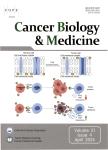Molecular heterogeneity of anti-PD-1/PD-L1 immunotherapy efficacy is correlated with tumor immune microenvironment in East Asian patients with non-small cell lung cancer
Molecular heterogeneity of anti-PD-1/PD-L1 immunotherapy efficacy is correlated with tumor immune microenvironment in East Asian patients with non-small cell lung cancer作者机构:Department of Thoracic SurgeryNational Cancer Center/National Clinical Research Center for Cancer/Cancer HospitalChinese Academy of Medical Sciences and Peking Union Medical CollegeBeijing 100021China Department of Thoracic SurgeryRuijin HospitalShanghai Jiao Tong University School of MedicineShanghai 200025China Department of PathologyNational Cancer Center/National Clinical Research Center for Cancer/Cancer HospitalChinese Academy of Medical Sciences and Peking Union Medical CollegeBeijing 100021China
出 版 物:《Cancer Biology & Medicine》 (癌症生物学与医学(英文版))
年 卷 期:2020年第17卷第3期
页 面:768-781页
核心收录:
学科分类:1002[医学-临床医学] 100214[医学-肿瘤学] 10[医学]
基 金:This work was supported by grants from the National Natural Science Foundation of China(Grant Nos.81802299,81502514,and 81702841) the Fundamental Research Funds for the Central Universities(Grant No.3332018070) the CAMS Innovation Fund for Medical Sciences(CIFMS)(Grant Nos.2016-I2M-1-001 and 2017-I2M-1-005) the National Key Basic Research Development Plan(Grant No.2018YFC1312105) the Graduate Innovation Funds of Peking Union Medical College(Grant No.2019-1002-06) the China Postdoctoral Science Foundation Grant(Grant No.2019M650568) the Guangci Distinguished Young Scholars Training Program(Grant No.GCQN-2018-A09)
主 题:NSCLC East Asian oncogene mutations PD-1/PD-L1 inhibitors immune microenvironment
摘 要:Objective:The aim of this study was to investigate how the tumor immune microenvironment differs regarding tumor genomics,as well as its impact on prognoses and responses to immunotherapy in East Asian patients with non-small cell lung cancer(NSCLC).Methods:We performed an integrated analysis using publicly available data to identify associations between anti-programmed death 1(PD-1)/programmed death-ligand 1(PD-L1)immunotherapy efficacy and classic driver oncogene mutations in East Asian NSCLC *** pooled and clinical cohort analyses were used to correlate driver oncogene mutation status and tumor microenvironment based on PD-L1 and CD8+tumor-infiltrating lymphocytes(TILs).Immune infiltrating patterns were also established for genomic NSCLC subgroups using the CIBERSORT ***:Based on East Asian NSCLC patients,TIDE analyses revealed that for anti-PD-1/PD-L1 immunotherapy,epidermal growth factor receptor(EGFR)-mutant and anaplastic lymphoma kinase(ALK)-rearranged tumors yielded inferior responses;however,although Kirsten rat sarcoma viral oncogene homolog(KRAS)-mutant tumors responded better,the difference was not statistically significant(EGFR:P=0.037;ALK:P0.001;KRAS:P=0.701).Pooled and clinical cohort analyses demonstrated tumor immune microenvironment heterogeneities correlated with oncogenic *** results showed remarkably higher PD-L1-and TIL-positive KRAS-mutant tumors,suggesting KRAS mutations may drive an inflammatory phenotype with adaptive immune ***,the EGFR-mutant or ALK-rearranged groups showed a remarkably higher proportion of PD-L1-/TIL-tumors,suggesting an uninflamed phenotype with immunological ***,similar to triple wild-type NSCLC tumors,EGFR L858R-mutant tumors positively correlated with an inflammatory phenotype,suggesting responsiveness to anti-PD-1/PD-L1 immunotherapy(P0.05).Furthermore,the CIBERSORT algorithm results revealed that EGFR-mutant and ALK-rearranged tumors were characterize



